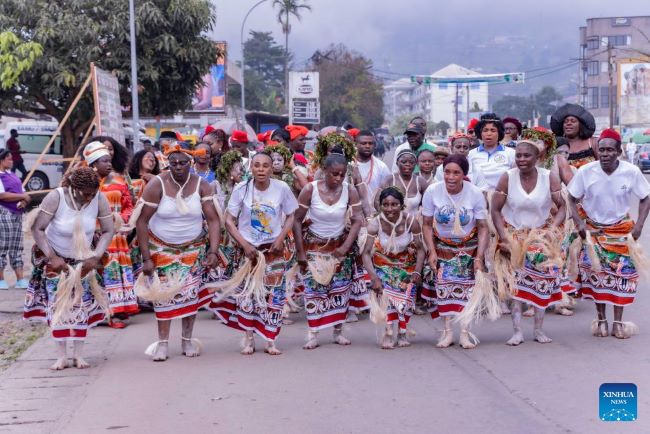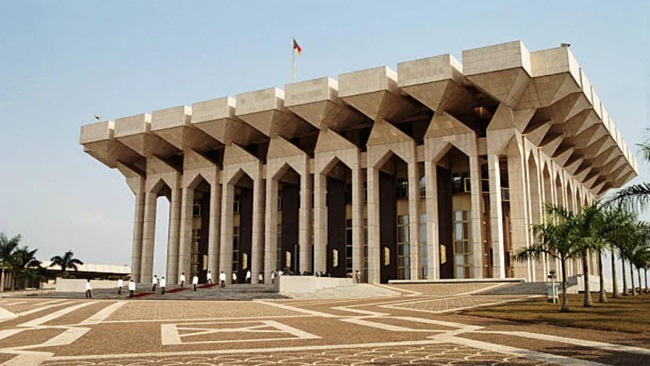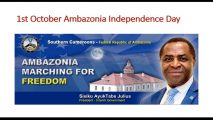Privacy Overview
This website uses cookies so that we can provide you with the best user experience possible. Cookie information is stored in your browser and performs functions such as recognising you when you return to our website and helping our team to understand which sections of the website you find most interesting and useful.

















5, February 2022
The British Southern Cameroonians who don’t enjoy football 0
The Africa Cup of Nations (Afcon) buzz that has gripped Cameroon, which not even a stampede and eight people dying could damper, has yet to reach some parts of the country even as the tournament reaches its crescendo. In certain areas of the central African nation, watching football is a luxury.
While most of Cameroon and the rest of the continent have been enjoying the football fiesta, fear and militarisation have gripped the English-speaking parts of the country. The government pulled out all the stops to ensure no embarrassment when those fighting for secession threatened to use the Afcon to amplify their voice and cause.
At the heart of this is the so-called Anglophone crisis that began in 2017 with a strike against the marginalisation of those in the English-speaking parts of the largely Francophone country. This culminated in a strong push for secession of the Northwest and Southwest regions.
The ugly side of the beautiful game
Ardent football fan Tata Tilion comes from Buea, the capital of the Southwest Region. With Cameroon hosting the continental showpiece for the first time in 50 years, he had been looking forward to enjoying the extravaganza. But when it came, insecurity had got the better of his hometown and made football a menace to his existence.
“Teams lodging in Buea aren’t comfortable. They train with so much fear. Imagine having just military people watching training sessions,” says Buea resident Obasse Romeo.
Limbé in the Southwest Region hosted Group F – Mali, Tunisia, The Gambia and Mauritania – and two last-16 matches. But for Tilion and many like him, going to the stadium to enjoy the tournament didn’t cross their minds because of the prevailing atmosphere.
Stray bullets
The situation is worse on Mondays. This is the day when separatist fighters impose a sit-at-home strike. “The town is dreadful … [Only] courageous people are on the streets because anything can happen,” says Tilion.
As a taxi driver, he is forced to leave his home on Mondays. “The issue is you don’t know who is monitoring or if the separatist fighters have spotted you.”
In this area, secessionists fighting President Paul Biya’s French-majority government to form a breakaway state called Ambazonia are everywhere and do not wear identifiable attire. They infiltrate gatherings and public places to gain information. Improvised explosive devices that are suspected to have come from them have killed many people, particularly those they said had disobeyed their orders or sympathised with the government.
Inside the stampede at Olembé Stadium
This is why Tilion has been watching the tournament on television rather than risk his life to the detriment of his wife, three children and other relatives. Stray bullets killed three people on the opening day for Group F during shootings by both state forces and secessionist fighters.
Since the crisis started, more than 3 500 people have died during spates of violence and about 700 000 forced to flee the two English-speaking regions of Cameroon, according to UN reports.
The death of team spirit
Football fan Tiku Musu Kasa has no problem with the government deploying gun-wielding soldiers. “The advantage we have now is witnessing it [the Afcon] and being able to recount to the next generation. If you are watching it on television or following it on radio, you will not be able to give a vivid testimony of the experience in years to come.”
Kasa appreciates the role football has played to bring unity to the country. “After the abortive coup d’état of 1984, a lot of hatred continued in Cameroon, and there was an opportunity for another coup.
“But with the brilliant performance of the Indomitable Lions of Cameroon, defeating 1986 World Cup holders Argentina in the presence of the god of football at the time, Diego Armando Maradona, and other victories in the same tournament, it made people move with peace plants all over. Peace automatically returned to the country.”
During that period, people watched football freely all over the country. Sociocultural and economic activities boomed. Kasa remembers how Ekata Farmers FC of Bafia pulled in the crowds when they visited Kumba to play.
“When Cameroon had to play, people used to wear their jerseys, flags. Some dressed like footballers with boots and walked the streets. If you were a fan of a particular player, you wore that player’s jersey.”
Today, “people are afraid that if they wear team colours, fighters and people with secessionist ideas will consider them blacklegs”, Kasa says referring to the derogatory term used against people who act against trade unions by working when others are on strike. He continued that secessionists also “kill, beat them or burn their houses”.
Match day with the military
It is match day in Limbé on Sunday 23 January. In neighbouring Buea, with six hours to go before Burkina Faso’s clash with Gabon in the last 16. There are no vuvuzelas, excitement, flags or Afcon colours. The streets are heavily militarised, and soldiers line the roads and watch over suspicious joints and byways. Some use incomplete buildings and flyovers as watchtowers.
Here, unlike in the other host cities, sirens and escort drivers are not in use, perhaps for fear of attracting fighters. The driver of the Confederation of African Football-branded bus taking reporters to the stadium makes two stops to pick up journalists, much to the dismay of the military escorts who see it as risky.
Limbé is relatively calm, a little more congested with fans waving as we pass. Traffic police officers clear the way as we descend to Ngueme, where the stadium is located.
Down right, another contingent of soldiers lines both sides of the road. Checkpoints, too. Security is tight at the entrance with others along the stadium’s perimeter. Unlike in Buea, there are fans walking, some running, some gesturing at us to help them catch up with the game.
Before kick off, Gabonese fan Manitou, who refers to himself only by his first name, says he was afraid to come to Limbé. “On my way here, I saw military people with firearms. They told me that the area had security issues. That’s why I decided to lodge in Douala. But personally, I think it’s good. It prevents those coming with bad intentions. Our government provided 10 buses to transport us and we were escorted by these soldiers. That’s needed for us to feel secure.”
Somehow, attendance at the 20 000-seater stadium is impressive. Ruling party politicians and pro-regime administrators desperately mobilised crowds to show up at the stadium to cheer. Spectators say they received free tickets and vaccination passes – even those who aren’t inoculated.
Abductions and torture
When the Afcon ends on 6 February and all the dignitaries are gone, a good number of soldiers will be taken off the streets. Problems will remain. Football will still be a tough sport to follow.
Shootings, killings, burnings, brutality and kidnappings have seen many amateur clubs withdraw from regional competitions. The few enduring ones play fewer games, with matches held in towns that offer better security, such as Kumba, Buea, Limbé and Bamenda. The peripheries are no-go zones.
Former footballer Obasse Romeo remembers the day that unknown gunmen attacked Mount Cameroon FC players at training. Players subsequently withdrew for their safety.
Amba Boys, as separatist fighters are commonly referred to, send death threats and disrupt games. They abducted Buea University’s football team from the campus training ground and tortured them. Unknown gunmen shot and killed Kombe Israel, the owner of Bau Manibok FC, in Kumba in June 2021.
The dark side of sport’s power
In the country’s Northwest Region, second and first-tier clubs have had their share of trouble too.
Emmanuel Ndoumbe Bosso, the former coach of Yong Sports Academy (Yosa), was kidnapped while driving to the club’s training ground. Augustine Choupo, the coach of 2020 Cameroon league one champions PWD Bamenda, was also kidnapped. The clubs didn’t say if ransoms were paid to secure their releases, and Bosso left after the incident.
When the clubs host league games, gun-wielding officers serve as stewards. This is after armed groups attacked visiting Dragon de Yaoundé as they made their way to a match venue in Bamenda. Heavily armed security forces accompany visiting teams to and from the field, and sometimes out of town. When a game ends, the visiting team is quickly taken away, sometimes before they have even changed out of their match jerseys.
Club repercussions
Yosa press officer Wanchia Cynthia says the instability in the region has affected their club. “Initially, we had Francophone players ready to play for the team. But since 2021, it hasn’t been the case, reason being the insecurity. Those players are afraid of kidnappers and stray bullets. Yogo Sorel is the only Francophone who played for the team last year.”
This isn’t an issue for the team though, says Wanchia, because it has made room for players from the two English-speaking regions.
The Bamenda Olympic Stadium project remains unfinished. Constructors are said to blame the slow progress on insecurity in the area.
Kasa says the crisis isn’t helping in any way. He wants peace to return so “young people will express their talents and football will grow again”.
Culled from New Frame